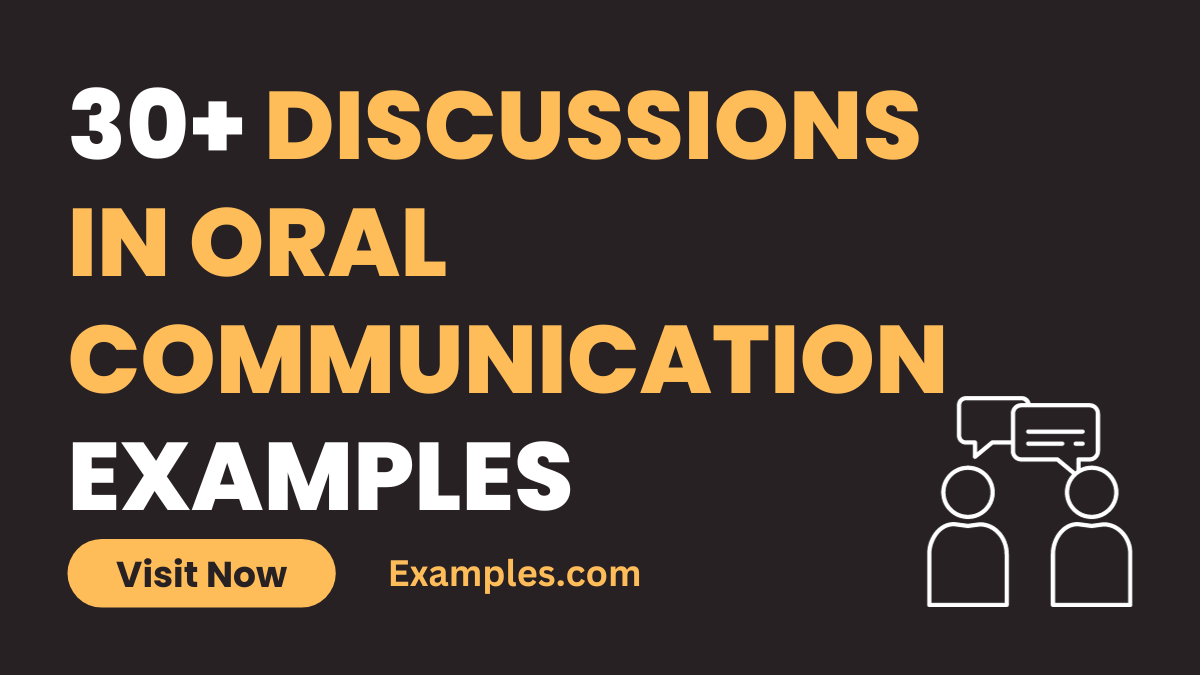29+ Discussions in Oral Communication Examples
Embark on a comprehensive journey through the intricacies of Discussions in Oral Communication with our complete guide. This resource unveils effective strategies, methods, and Communication Examples, providing a nuanced understanding of interpersonal dynamics. Whether navigating workplace dialogues or enhancing social media interactions, we delve into practical tips for fostering meaningful discussions. Elevate your oral communication skills with real-life examples, unlocking the key to impactful and assertive communication in various settings. Join us on this enriching exploration of effective communication practices.
30 Examples of Discussions in Oral Communication
Explore 30 vivid Discussions in Oral Communication Examples to sharpen your communication prowess. From workplace scenarios to social interactions, this guide offers a diverse array of instances that demonstrate effective communication strategies. Each example is crafted for practical insights, ensuring you grasp the nuances of assertive, interpersonal, and strategic communication.
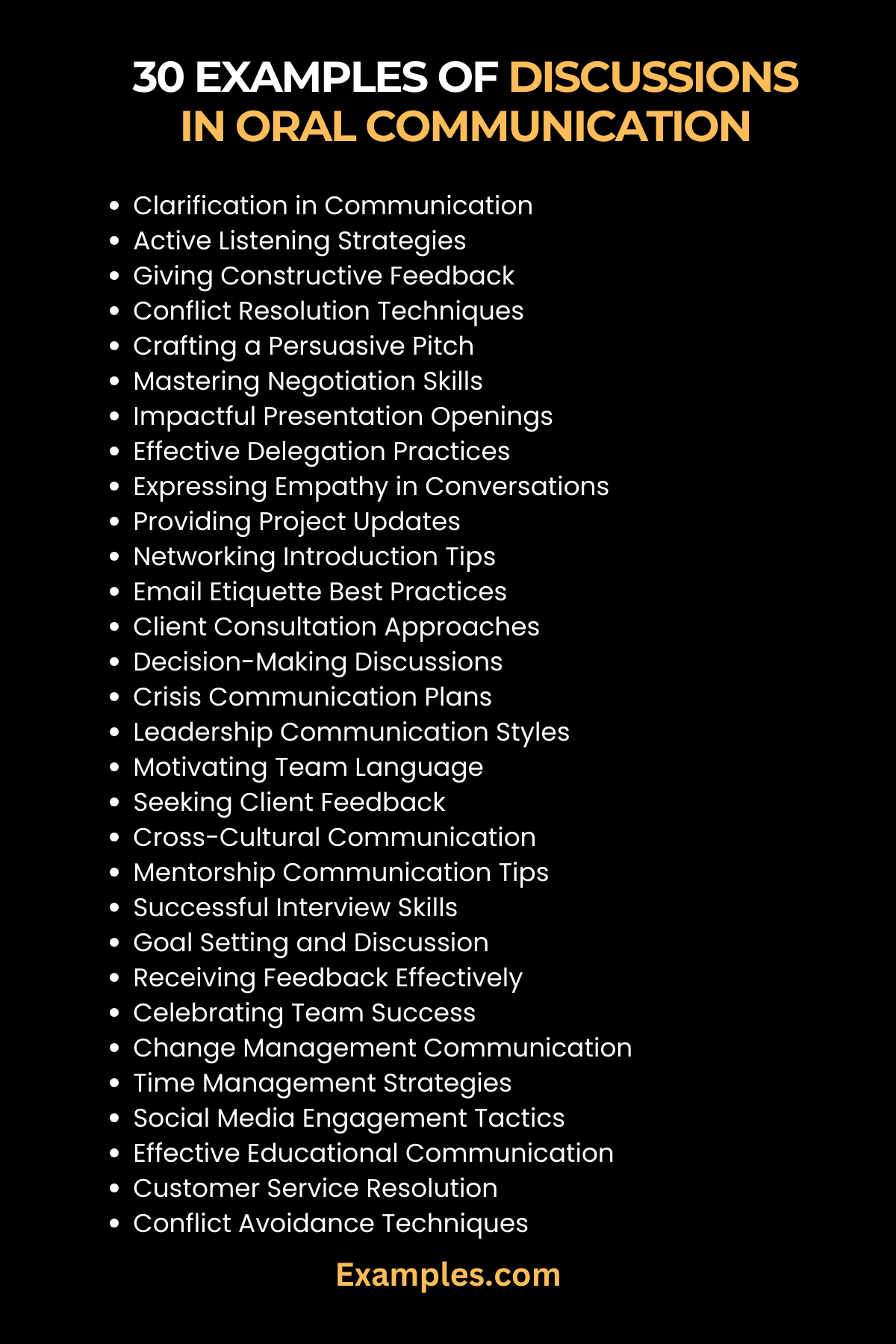
- Clarification: When discussing project details, seek clarification to avoid misunderstandings. Communicate with precision for seamless collaboration.
- Active Listening: In team meetings, exhibit active listening by paraphrasing others’ points. Enhance understanding and foster a collaborative environment.
- Constructive Feedback: Provide constructive feedback during performance reviews. Highlight strengths and suggest improvements for professional growth.
- Conflict Resolution: Address conflicts by using “I feel” statements. Open dialogue for resolutions and strengthened team dynamics.
- Persuasive Pitch: In sales, craft a persuasive pitch that highlights benefits. Captivate your audience with compelling communication.
- Negotiation Skills: negotiate terms by clearly articulating your needs. Find common ground for mutually beneficial outcomes.
- Presentation Impact: Deliver presentations with a impactful opening. Capture attention and set the tone for a memorable discourse.
- Delegation: When delegating tasks, communicate expectations clearly. Ensure a shared understanding for successful project execution.
- Empathy Expression: express empathy in difficult conversations. Acknowledge emotions and build a supportive dialogue.
- Project Updates: Provide concise project updates during team meetings. Keep stakeholders informed for efficient collaboration.
- Networking Introduction: introduce yourself with a concise pitch in networking events. Make a memorable impression for future connections.
- Email Etiquette: maintain professionalism in email communication. Clearly articulate ideas and expectations for effective correspondence.
- Client Consultation: In client consultations, ask probing questions. Tailor solutions to their needs for a personalized client experience.
- Decision-Making Discussion: discuss decisions openly with the team. Foster transparency and collective ownership in the decision-making process.
- Crisis Communication: During crises, communicate action plans. Provide reassurance and maintain transparency to mitigate concerns.
- Leadership Communication: articulate a vision in leadership communication. Inspire and align the team towards common goals.
- Team Motivation: use motivational language to inspire your team. Foster a positive and productive work environment.
- Client Feedback: seek client feedback for improvement. Demonstrate a commitment to continuous enhancement of products or services.
- Cross-Cultural Communication: In cross-cultural interactions, adapt your communication style. Respect diverse perspectives for effective global collaboration.
- Mentorship Communication: provide guidance in mentorship communication. Share experiences and insights to nurture professional growth.
- Interview Skills: In interviews, showcase your strengths. Communicate your achievements effectively for a lasting impression.
- Goal Setting Discussion: discuss and set SMART goals with your team. Ensure clarity and commitment to achieving shared objectives.
- Feedback Reception: receive feedback with an open mind. Demonstrate a willingness to learn and grow from constructive criticism.
- Celebrating Success: In team achievements, celebrate success. Acknowledge contributions and boost team morale through positive communication.
- Change Management Communication: communicate changes with transparency. Address concerns and guide the team through periods of transition.
- Time Management Discussion: discuss time management strategies. Optimize productivity by fostering efficient communication around task prioritization.
- Social Media Engagement: engage your audience on social media. Create captivating content that sparks discussions and interactions.
- Educational Communication: explain complex concepts in educational settings. Ensure understanding through clear and concise communication.
- Customer Service Resolution: In customer service, resolve issues promptly. Demonstrate empathy and effective communication for customer satisfaction.
- Conflict Avoidance: Boldly navigate discussions to avoid conflicts. Foster a collaborative atmosphere through proactive communication.
Discussions in Oral Communication at Work
Navigate workplace dynamics with our guide to Discussions in Oral Communication at work. Discover strategies for effective collaboration, assertive communication, and conflict resolution. Elevate your professional interactions with practical examples tailored for the corporate environment.
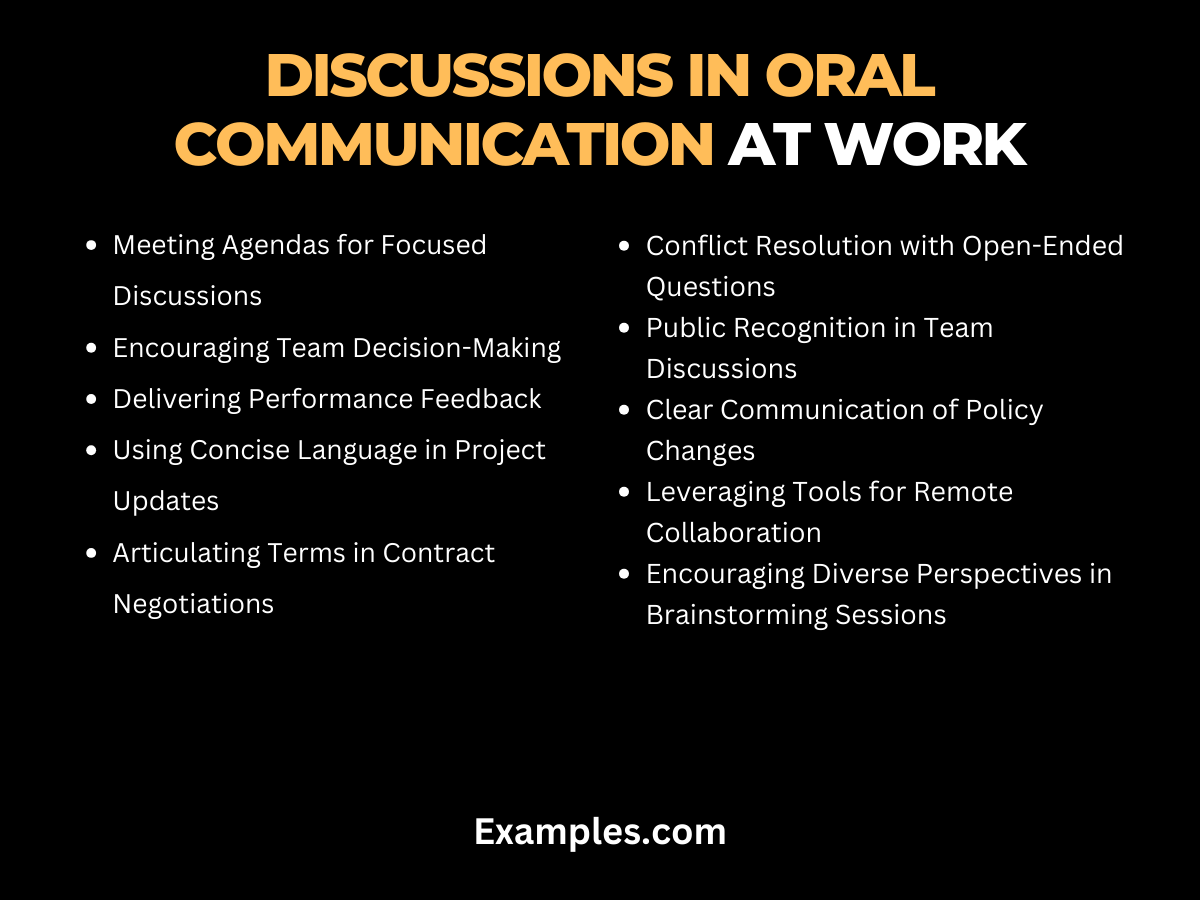
- Meeting Agendas: Clearly outline meeting agendas for focused discussions. Provide participants with a roadmap for efficient communication.
- Team Decision-Making: Encourage team members to express opinions in decision-making. Foster a collaborative environment for inclusive discussions.
- Performance Feedback: Deliver performance feedback with a balance of praise and improvement areas. Promote professional growth through constructive communication.
- Project Updates: Use concise language in project updates. Keep stakeholders informed without overwhelming them with unnecessary details.
- Negotiating Contracts: Clearly articulate contract terms during negotiations. Ensure mutual understanding for successful business agreements.
- Conflict Resolution Talks: Approach conflicts with open-ended questions for constructive resolution talks. Encourage dialogue for lasting solutions.
- Employee Recognition: Publicly recognize employee achievements in team discussions. Boost morale and reinforce positive behaviour.
- Policy Communication: Clearly communicate policy changes to avoid misunderstandings. Ensure all team members are informed and compliant.
- Remote Collaboration: Leverage communication tools for seamless remote collaboration. Foster a sense of connection and productivity among virtual teams.
- Brainstorming Sessions: Encourage diverse perspectives in brainstorming sessions. Create an environment where all ideas are valued and explored.
Discussions in Oral Communication at University
Master the art of Discussions in Oral Communication at university with our comprehensive guide. From effective class participation to group projects, explore strategies and examples tailored for the academic setting.
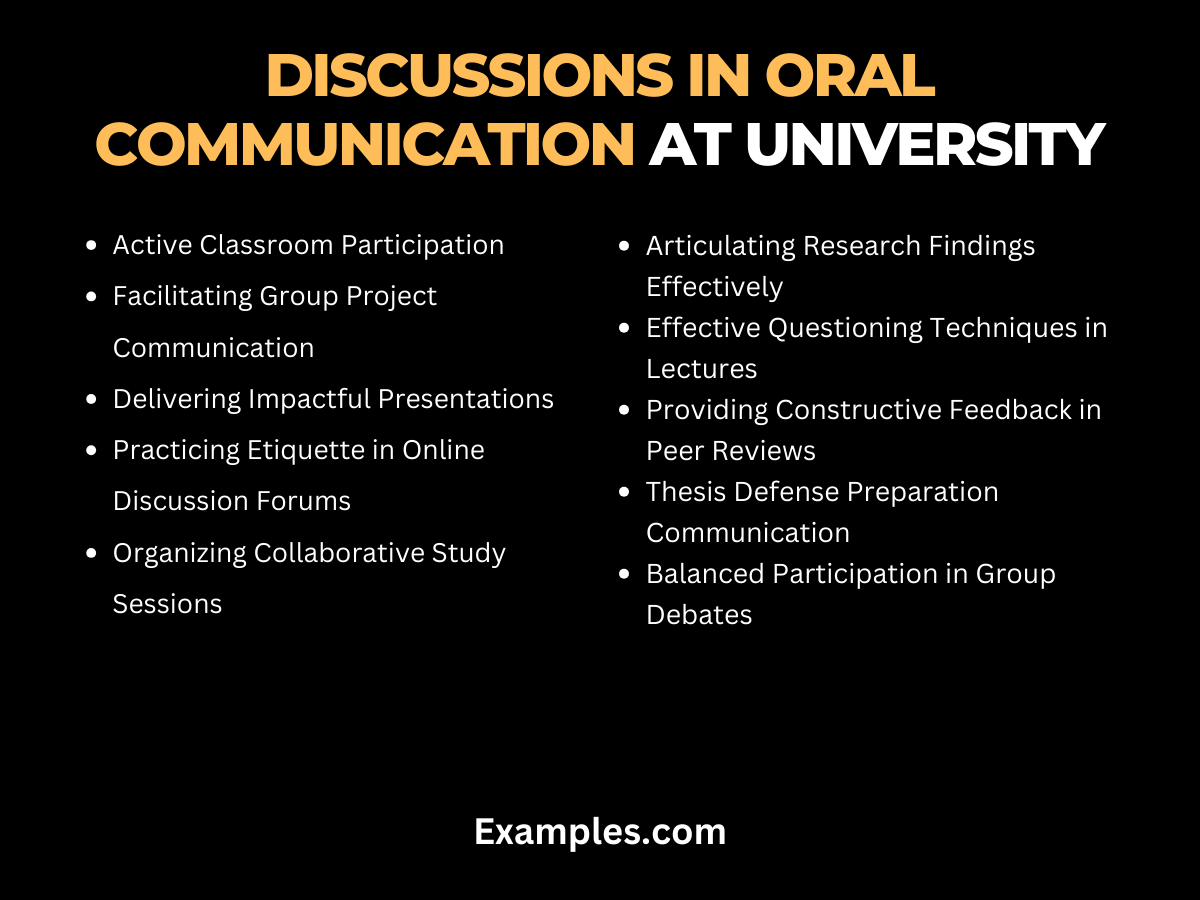
- Classroom Participation: Engage actively in classroom discussions. Contribute thoughtful insights to enhance the learning experience for everyone.
- Group Project Coordination: Facilitate effective communication within group projects. Clearly define roles and expectations for seamless collaboration.
- Presentations with Impact: Deliver impactful presentations using visual aids. Capture your audience’s attention and convey complex ideas with clarity.
- Discussion Forum Etiquette: Practice polite and constructive language in online discussion forums. Foster a respectful digital learning community.
- Collaborative Study Sessions: Organize study sessions with classmates for collaborative learning. Share resources and insights for mutual academic success.
- Effective Communication in Research: Clearly articulate research findings in academic discussions. Contribute to the scholarly discourse with precision and clarity.
- Questioning Techniques: Use effective questioning techniques during lectures. Seek clarification and deepen your understanding through thoughtful inquiries.
- Peer Review Discussions: Provide constructive feedback in peer review discussions. Support your peers’ academic growth through thoughtful and insightful comments.
- Thesis Defence Preparation: Practice effective oral communication in thesis defence preparation. Anticipate questions and articulate your research findings with confidence.
- Group Debate Participation: Engage in group debates with a balanced and evidence-based approach. Present your arguments coherently for persuasive communication.
What are Discussions in Oral Communication strategies?
Effective discussions in oral communication are essential for fostering understanding, collaboration, and successful outcomes. Explore these strategies to enhance your conversational skills:
- Active Listening: Engage fully in the conversation, demonstrating your attentiveness and understanding by paraphrasing and asking clarifying questions.
- Clarity and Conciseness: Articulate your thoughts clearly and concisely to ensure your message is easily understood, avoiding unnecessary complexity.
- Open-Ended Questions: Encourage dialogue by posing open-ended questions that invite detailed responses, promoting deeper and more meaningful discussions.
- Nonverbal Communication: Pay attention to nonverbal cues such as body language and facial expressions, enhancing the overall effectiveness of your communication.
- Adaptability: Tailor your communication style to your audience, considering their preferences and adjusting your approach to ensure effective interaction.
- Empathy Expression: Demonstrate empathy by acknowledging others’ feelings and perspectives, creating a more inclusive and supportive communication environment.
- Clear Objectives: Define the objectives of the discussion from the outset, ensuring participants are aware of the goals and can contribute meaningfully.
- Constructive Feedback: Provide feedback that is constructive and specific, highlighting areas of improvement while recognizing and reinforcing positive contributions.
- Conflict Resolution Techniques: Develop skills in managing conflicts by addressing issues calmly, actively listening to all parties, and finding mutually agreeable solutions.
- Effective Use of Technology: Leverage communication tools appropriately, ensuring they enhance rather than hinder discussions, especially in virtual or remote settings.
What are the 4 types of oral communication?
Understanding the diverse forms of oral communication is crucial for navigating various contexts. Explore these four types to refine your communication skills:
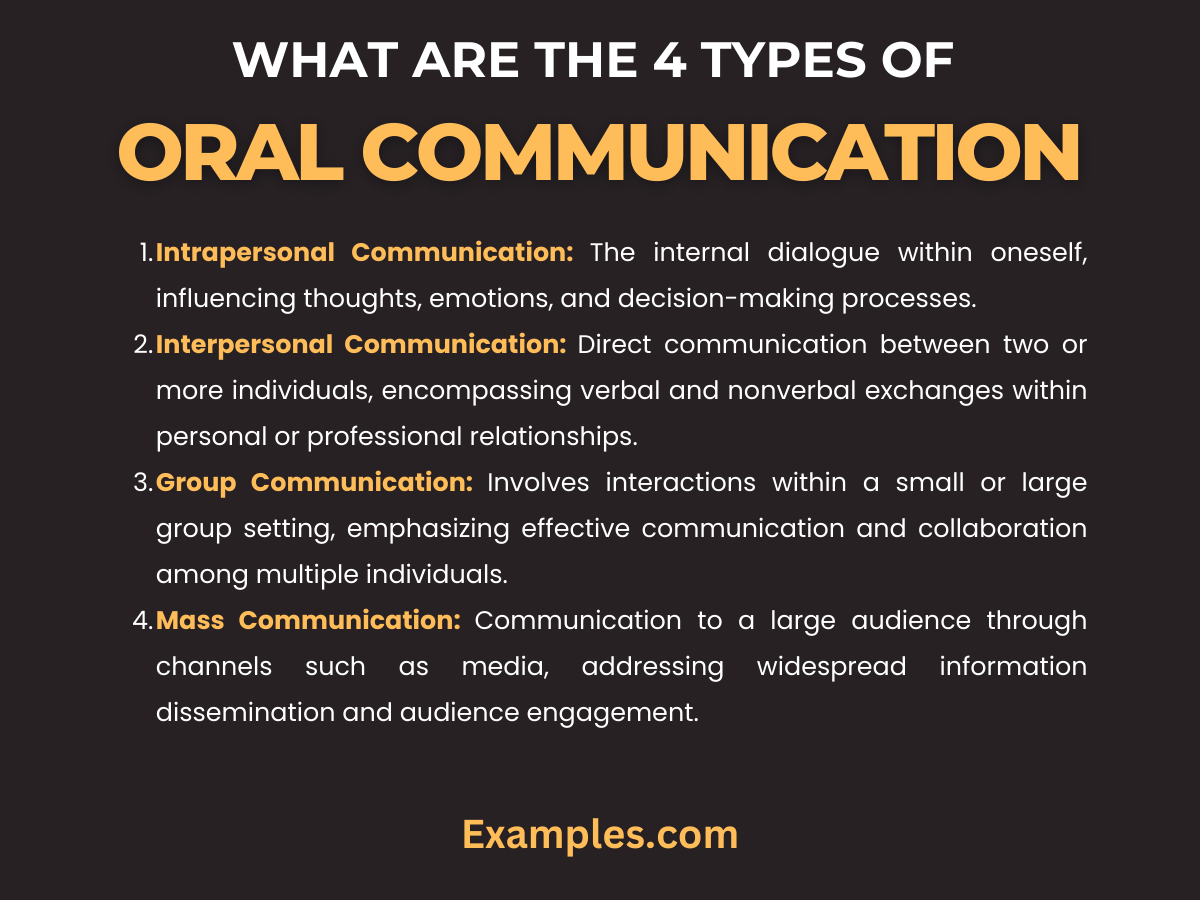
- Intrapersonal Communication: The internal dialogue within oneself, influencing thoughts, emotions, and decision-making processes.
- Interpersonal Communication: Direct communication between two or more individuals, encompassing verbal and nonverbal exchanges within personal or professional relationships.
- Group Communication: Involves interactions within a small or large group setting, emphasizing effective communication and collaboration among multiple individuals.
- Mass Communication: Communication to a large audience through channels such as media, addressing widespread information dissemination and audience engagement.
In the realm of oral communication, the power of discussions cannot be overstated. Whether in a professional setting, an academic environment, or casual social interactions, effective discussions are the cornerstone of productive communication. It’s essential to understand that the quality of our conversations directly influences the outcomes of our interactions. By harnessing the strategies outlined, such as active listening, clarity, empathy, and adaptability, individuals can elevate their communication skills, leading to more fruitful and meaningful exchanges.
Moreover, the digital era has transformed the way we communicate, making it imperative to adapt these skills for virtual environments. The Harvard Business Review provides insightful strategies on how to navigate remote communication effectively. Their article, “How to Collaborate Effectively If Your Team Is Remote”, offers valuable tips on maintaining clear and impactful communication in a virtual setting, an increasingly relevant skill in today’s world.
Fostering Growth Through Communication
As we continue to navigate various communication landscapes, it’s important to remember that the art of discussion is not just about conveying information; it’s about connecting with others, sharing ideas, and building relationships. For educators and students looking to delve deeper into the nuances of oral communication, the Stanford University School of Education provides a wealth of resources. Their page on Communication Resources for Educators is an excellent starting point for those seeking to enhance their communication skills in educational settings. This link offers guidance and tools to help educators and students alike in refining their oral communication abilities, thereby contributing to their personal and professional growth.
In conclusion, mastering the art of discussion in oral communication is a continuous journey, one that requires practice, reflection, and a willingness to adapt. By embracing these principles and utilizing the resources available, we can all improve our communication skills, leading to more effective, engaging, and rewarding interactions in all areas of our lives.



